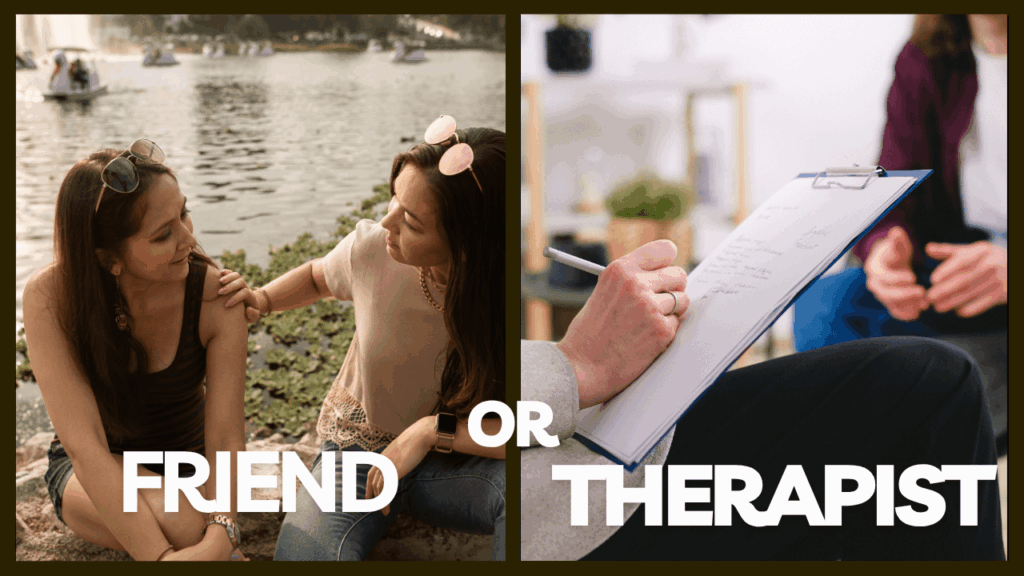How to Know If You Should Talk to a Friend or a Therapist
Geenishka Khanna
Student of Psychology, University of Windsor, Ontario
You’re going through something tough. Maybe you’re overwhelmed, stuck in your thoughts, or just emotionally drained. You ask yourself: Should I talk to a friend, or is it time to see a therapist?
It’s a deeply personal question—and an important one. While both friends and therapists can provide emotional support, they play very different roles in your healing and growth.
In this blog, you’ll learn how to tell the difference, know when each is helpful, and decide who you should turn to right now.
Key Takeaways
Friends offer comfort, validation, and shared experiences.
Therapists offer professional, unbiased support and tools for healing.
If you feel stuck, overwhelmed, or notice recurring issues, therapy might be the next step.
You don’t have to choose one over the other—both can play supportive roles.
Talking to a therapist is not a sign of weakness, but a step toward clarity and wellness.
Talking to a Friend
Friends are often our first go-to when things feel heavy. A good friend can:
- Listen with empathy
- Make you feel seen and heard
- Offer relatable advice
- Remind you you’re not alone
Turn to a friend when:
- You need to vent
- You’re looking for emotional comfort
- You want support, not solutions
- You’re dealing with a temporary, manageable situation
Friends can be incredibly validating—but they’re not trained to manage deep emotional pain or mental health concerns.

Talking to a Therapist
Therapists are trained mental health professionals. They listen without judgment, help you understand patterns in your thinking, and offer tools to heal and grow.
Turn to a therapist when:
- You’re feeling persistently anxious, sad, or overwhelmed
- Your thoughts or feelings are impacting your day to day tasks including sleeping or eating habits
- You’re facing unresolved trauma or grief
- You’ve noticed harmful or repetitive life patterns
- Talking to friends hasn’t helped or feels like a burden to them
Unlike friends, therapists offer structured support and complete confidentiality. They’re trained to help you unpack what’s hard to say—even to yourself.
Ask Yourself These Key Questions
Before deciding who to talk to, ask yourself:
What do I need right now—comfort, clarity, or healing?
Is this issue short-term or something that’s been lingering?
Have I already spoken to friends, but still feel stuck?
Are my emotions affecting my sleep, appetite, relationships, or focus?
Do I need someone to just listen—or help me shift patterns?
Your answers will guide you toward the type of support that’s most helpful in this moment.
Sometimes, You Need Both
The good news? You don’t have to choose one or the other.
Friends help with everyday struggles, connection, and feeling supported.
Therapists help with deeper issues, emotional healing, and personal transformation.
For example: You might talk to a friend about a bad day, and to a therapist about why you feel like you’re never good enough. Both conversations serve different—but valuable—purposes.
The Stigma Trap: Let’s Break It
Still hesitant to reach out to a therapist? You’re not alone. Many people worry that it makes them appear “weak” or “broken.”
In reality, seeking therapy is a bold move toward self-awareness. Just like we go to doctors for physical pain, therapists are here for emotional and mental wellness.
Talking to friends is helpful. But when emotional challenges feel too heavy or persistent, it’s not just okay—it’s necessary to seek professional help.
How to Take the First Step
Ready for therapy?
- Research licensed professionals on trusted platforms or visit bookmytherapy
- Schedule a free consultation—many therapists offer 15–20 minute calls
- Ask about their approach, specialties, and how they can support your needs
Want to talk to a friend?
- Be clear about what you need: a listener, advice, or just someone to be there
- Choose someone who respects your boundaries and is emotionally available
- Don’t expect them to “fix” you—sometimes, sharing space is enough
Conclusion
Choosing between talking to a friend and seeing a therapist isn’t always easy—but it’s a choice that deserves thought and self-compassion.
If you’re feeling low and need to vent, your friend may be enough. But if the weight you’re carrying doesn’t ease, or keeps returning, it might be time to connect with a therapist.
You deserve to feel heard, supported, and empowered. Whether it’s through friendship, therapy, or both—what matters most is that you take the step toward healing.
- Login
- Sign Up